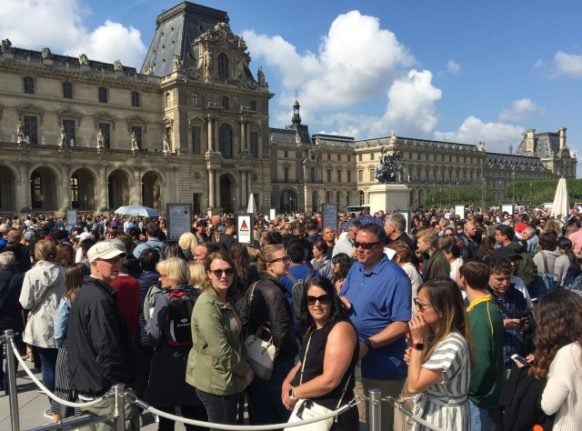On Wednesday the Louvre's official Twitter account announced that the museum would be open later than usual due to a “general meeting attended by members of the Musée du Louvre’s reception and security staff”.
The museum finally opened at about 11am, but said that due to the crowds, only people with pre-booked time-slot tickets will be admitted on Wednesday.
READ ALSO:
Due to a general meeting attended by members of the Musée du Louvre’s Reception and Security staff, the museum will open later than usual on Wednesday, May 29, 2019.
We apologize for any inconvenience caused and thank you for your patience. pic.twitter.com/p1LaBse9Ec
— Musée du Louvre (@MuseeLouvre) May 28, 2019
The meeting was to decide the next steps after reception and security staff went on strike on Monday, leading to the museum's closure, which left thousands of tourists disappointed.
“Staff will meet in a general meeting on Wednesday morning to decide what to do next depending on the responses we get from the museum and ministry management,” the Sud Culture Solidaires union told The Local on Monday.
Open the doors #Louvre pic.twitter.com/8B1JaM9bcz
— Julie Saffrin (@gadhill) May 29, 2019
One family visiting from the US said they had been waiting for over three hours, and had also tried to visit on Monday.
Rohan Mekala, from Edison, New Jersey, said: “We were here all Monday morning, from about 8:30-11:30. Nobody told us what was going on, they just kept telling us to wait longer and longer.

The Mekala family from New Jersey waiting outside the Louvre. Photo: The Local
The reason for the strike was the “suffocating” conditions which staff say is caused by overcrowding, with the number of tourists jumping by 20 percent since 2009, as well as a shortage of staff. Click here to read more about their grievances.
In a statement released on Monday the union Sud Culture Solidaires said: “The Louvre is suffocating” and that staff members have noticed a “deterioration in conditions for visitors and workers”.
On Wednesday, the Louvre also advised visitors to reserve their ticket online due to the fact that “high visitor numbers are expected over the coming days.”
High visitor numbers are expected in the coming days. For this reason, we strongly recommend buying tickets online to ensure entry to the museum.
— Musée du Louvre (@MuseeLouvre) May 28, 2019
The Louvre is normally open from 9am – 9.45pm on Wednesdays.



 Please whitelist us to continue reading.
Please whitelist us to continue reading.
Member comments